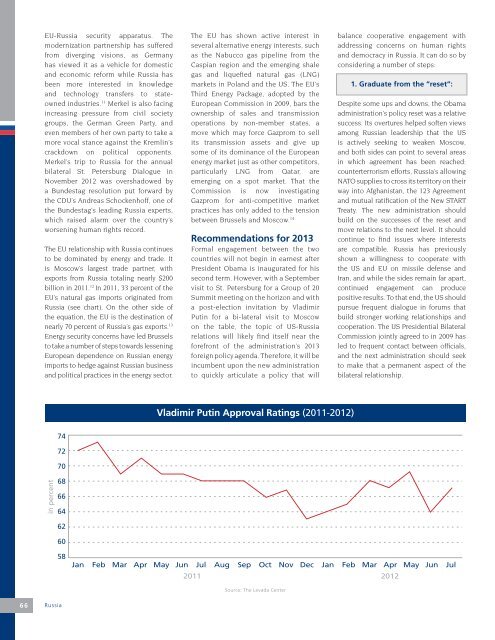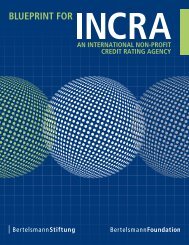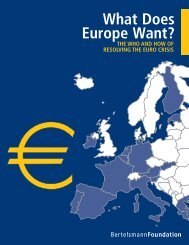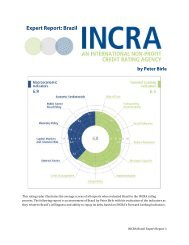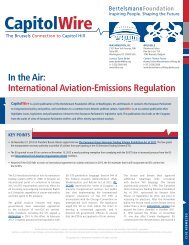EU-Russia security apparatus. Themodernization partnership has sufferedfrom diverging visions, as Germanyhas viewed it as a vehicle for domesticand economic reform while Russia hasbeen more interested in knowledgeand technology transfers to stateownedindustries. 11 Merkel is also facingincreasing pressure from civil societygroups, the German Green Party, andeven members of her own party to take amore vocal stance against the Kremlin’scrackdown on political opponents.Merkel’s trip to Russia for the annualbilateral St. Petersburg Dialogue inNovember 2012 was overshadowed bya Bundestag resolution put forward bythe CDU’s Andreas Schockenhoff, one ofthe Bundestag’s leading Russia experts,which raised alarm over the country’sworsening human rights record.The EU relationship with Russia continuesto be dominated by energy and trade. Itis Moscow’s largest trade partner, withexports from Russia totaling nearly $200billion in 2011. 12 In 2011, 33 percent of theEU’s natural gas imports originated fromRussia (see chart). On the other side ofthe equation, the EU is the destination ofnearly 70 percent of Russia’s gas exports. 13Energy security concerns have led Brusselsto take a number of steps towards lesseningEuropean dependence on Russian energyimports to hedge against Russian businessand political practices in the energy sector.The EU has shown active interest inseveral alternative energy interests, suchas the Nabucco gas pipeline from theCaspian region and the emerging shalegas and liquefied natural gas (LNG)markets in Poland and the US. The EU’sThird Energy Package, adopted by theEuropean Commission in 2009, bars theownership of sales and transmissionoperations by non-member states, amove which may force Gazprom to sellits transmission assets and give upsome of its dominance of the Europeanenergy market just as other competitors,particularly LNG from Qatar, areemerging on a spot market. That theCommission is now investigatingGazprom for anti-competitive marketpractices has only added to the tensionbetween Brussels and Moscow. 14Recommendations for 2013Formal engagement between the twocountries will not begin in earnest afterPresident Obama is inaugurated for hissecond term. However, with a Septembervisit to St. Petersburg for a Group of 20Summit meeting on the horizon and witha post-election invitation by VladimirPutin for a bi-lateral visit to Moscowon the table, the topic of US-Russiarelations will likely find itself near theforefront of the administration’s 2013foreign policy agenda. Therefore, it will beincumbent upon the new administrationto quickly articulate a policy that willbalance cooperative engagement withaddressing concerns on human rightsand democracy in Russia. It can do so byconsidering a number of steps:1. Graduate from the “reset”:Despite some ups and downs, the Obamaadministration’s policy reset was a relativesuccess. Its overtures helped soften viewsamong Russian leadership that the USis actively seeking to weaken Moscow,and both sides can point to several areasin which agreement has been reached:counterterrorism efforts, Russia’s allowingNATO supplies to cross its territory on theirway into Afghanistan, the 123 Agreementand mutual ratification of the New STARTTreaty. The new administration shouldbuild on the successes of the reset andmove relations to the next level. It shouldcontinue to find issues where interestsare compatible. Russia has previouslyshown a willingness to cooperate withthe US and EU on missile defense andIran, and while the sides remain far apart,continued engagement can producepositive results. To that end, the US shouldpursue frequent dialogue in forums thatbuild stronger working relationships andcooperation. The US Presidential BilateralCommission jointly agreed to in 2009 hasled to frequent contact between officials,and the next administration should seekto make that a permanent aspect of thebilateral relationship.Vladimir Putin Approval Ratings (2011-2012)747270in percent686664626058Jan Feb Mar Apr May JunJul Aug Sep Oct Nov Dec Jan Feb Mar Apr May Jun2011 2012Source: The Levada CenterJul6 6Russia
2. Prepare to grapple with Putin:The return of Putin to the Russianpresidency and the crackdowns ondissent raise immediate questionsover how relations will progress. Tohis domestic audience, Putin hasoften portrayed the US as a belligerenthegemon that acts counter to Russianinterests, sometimes using the US andNATO as scapegoats useful for whippingup nationalist fervor. The recent passageof legislation clamping down on politicalprotests, Internet freedom, and thefunding of Russian NGOs by foreigndonors is an attempt to eliminatepolitical opposition and reduce Westernengagement with Russian civil society,as seen in the recent eviction of USAIDstaff from the country.Yet Putin is also aware that Moscowcannot afford to ignore Europe and theUS. Russia has benefitted from Westerncooperation on many issues, such ascounterterrorism, and this is unlikelyto change under Putin. As internationalforces begin to draw down in Afghanistanpost-2014, Russia will be eager to workwith the US and Europe to ensurestability in northern Afghanistan and theSouthern Caucasus region. The Obamaadministration must work with Europeto create a common understanding withMoscow, one that takes the nationalinterests of both sides into account.Disagreements on global issues haveoften arisen because Russia felt itsnational interests were being ignored.In the Libya conflict, Putin’s contentionthat NATO overstepped the parametersof UN Security Council Resolution 1973spoke as much to Moscow’s concern overits economic interests in Libya as it didto concern over political sovereignty.On Syria, Putin has been steadfast inhis support of the Assad regime, inpart because the Russian naval base atTartus is one of its last remaining warmwateraccess ports. Recent comments byRussian officials suggest, however, thatthe Kremlin is preparing for the realitiesof a post-Assad Syria. 15 If the Obamaadministration can show that addressingthese issues is not a zero-sum gameand at least try to accommodateRussian concerns, it should find amore cooperative partner in Moscow ingeneral and Putin in particular. Europeand the US can entice Moscow intochanging its stance by guaranteeingRussia an important role in any post-Assad discussions.3. Understand today’sinternal dissent:While considering Moscow’s coreinterests is important, the US must alsotake great strides towards understandingand accommodating the new generationof Russian activists. The protests thatfollowed the parliamentary electionsin December 2011 and the presidentialelection in March 2012 demonstrateda widening chasm between thegovernment and the populace. Today’sactivists are no longer marginalizedliberal intelligentsia, but members of theyoung, urban middle class. The middleclass represents nearly 20 percent ofthe population and is expected to reach40 percent by 2020. 16 At the same time,a generation is coming of age that hasgrown up largely in the post-Soviet era.Of those who took part in the massiveprotest along Moscow’s ProspektSakharov on Dec. 24, 2011, 25 percentwere between the ages of 18 and 24, andmore than 50 percent were under 40. 17Today’s activists are nolonger marginalized liberalintelligentsia, but membersof the young, urbanmiddle class. The middleclass represents nearly 20percent of the populationand is expected to reach 40percent by 2020.Having accumulated wealth during theboom years from 2000 to 2008, Russia’smiddle class increasingly demandsmore political participation and greateraccountability and transparency fromgovernment institutions. Exposure toWestern countries through travel andbusiness, and widespread use of theInternet as a tool for communicationand knowledge, have fostered a growingdiscontent with the status quo. 18 Eventhe rural working class, one of Putin’smain bases of support, is increasinglydoubtful of the state’s ability toprovide health care and education andmaintain infrastructure. 19 If Russia’seconomic struggles continue, thedomestic situation will be prone tofurther fragmentation.The Obama administration, along withits European partners, should thereforework together to articulate a commonposition that takes the Kremlin’sforeign policy interests into accountwhile being assertive on political andhuman rights issues inside Russia. Bothsides have explored legislation (theso-called Magnitsky bills) that wouldbar the officials allegedly involved inthe death of Russian lawyer SergeiMagnitsky from entry into either the EUor US, with the US Congress recentlyapproving such legislation along withPermanent Normal Trade Relationstatus (PNTR) for Russia. The US shouldencourage European governments topass similar legislation in order to senda message to Kremlin officials and asa show of support to Russia’s growingactivist movement.4. Build upon the passageof PNTR by pursuing a broadermodernization agendawith Moscow:The recent passage of PNTR status forRussia by the US Congress highlightsthe potential growth of bilateral tradebut also its current shortcomings. WhileEurope and Russia maintain a large androbust trade relationship, economictrade and investment between the USand Russia has been relatively small,with Russia accounting for just 1.6% of USexports in 2011. 20 The passage of PNTRis expected to change that, bringinginnumerable benefits to US businesseswhile bringing US. companies intocompliance with WTO rules mandatingPNTR between members. US exports toRussia are forecast by some to doublefrom $9 billion in 2010 to nearly $19billion as WTO-mandated reductionson Russian tariffs are expected to createRussia6 7
- Page 3:
Field Manual to EuropeIntroduction
- Page 6:
multilateral channels. Europeanshav
- Page 9 and 10:
JuneBritish presidency of UNSCJune
- Page 12 and 13:
US-EU Investment vs. Global Nationa
- Page 14 and 15:
economic conditions in the eurozone
- Page 17 and 18: MEMO ONTHE EUROZONE CRISISThe State
- Page 19 and 20: attitude toward moral hazard. Withw
- Page 21 and 22: Greece: 2010 Bailout BreakdownGreec
- Page 23 and 24: the deficit from 4.5 percent to thr
- Page 27 and 28: NATO thus faces an uncertain future
- Page 29 and 30: 1. Consider NATO’s defensespendin
- Page 31 and 32: of-area operations and worldwidepar
- Page 33 and 34: concurrent terrorist attack in Beng
- Page 35: 2. Strengthen regionalpartnerships
- Page 38 and 39: MEMO ONCOUNTERTERRORISM ANDHOMELAND
- Page 40 and 41: home affairs (JHA), particularly in
- Page 43 and 44: Status of EU Countries in the US Vi
- Page 45 and 46: offensive capability centered at NA
- Page 47 and 48: socialized, i.e. there is a tacit e
- Page 49 and 50: such technology, such as deep packe
- Page 51 and 52: MEMO ONENERGY & CLIMATE CHANGEThe S
- Page 54 and 55: identifying the agents most qualifi
- Page 56 and 57: MEMO ONTURKEYThe State of PlayTurke
- Page 58 and 59: as a rising regional and internatio
- Page 60 and 61: CASE STUDY: TURKEY’S ENERGY ROLE:
- Page 62 and 63: 22%12%Turkey’s Main Trading Partn
- Page 64 and 65: MEMO ONRUSSIAThe State of PlayIn Pr
- Page 68 and 69: greater market access for US busine
- Page 70 and 71: MEMO ONCHINAThe State of PlayIn 201
- Page 72 and 73: But China’s competitive meridian
- Page 74 and 75: in millions of USDUS-China Bilatera
- Page 76 and 77: 7 6Acknowledgements
- Page 78 and 79: CITATIONSINTRODUCTION1See “Confid
- Page 80 and 81: 20Castle, S. (17 September, 2011).
- Page 82 and 83: ARAB UPRISING1Koch, C. (summer 2011
- Page 84 and 85: COUNTERTERRORISM & HOMELAND SECURIT
- Page 86 and 87: 21Healey, J. (January 2012). Beyond
- Page 88 and 89: 20Berlemont, I. (25 July, 2012). Fr
- Page 90 and 91: 24Putin, V. (6 September, 2012). An
- Page 92: Bertelsmann Foundation1101 New York


